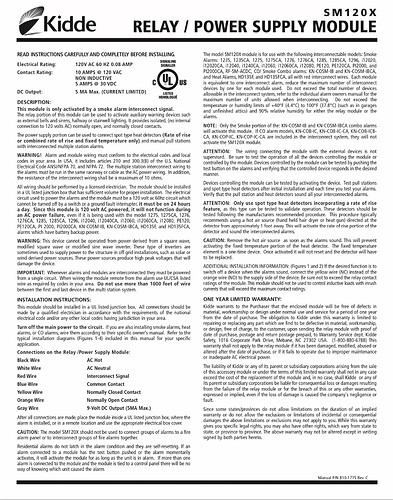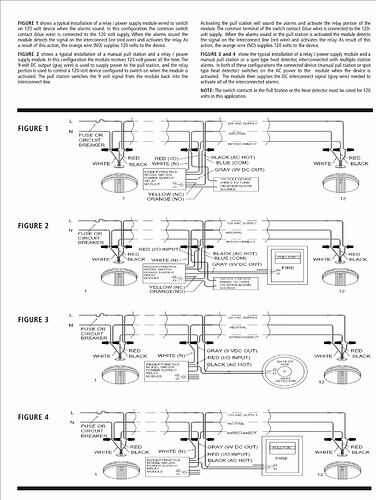Install regular hardwired smoke detectors and use an Ecolink FireFighter to be able to trigger on the detectors going off.
If you don't like @jlv's suggestion (which is what I use, btw), here's an alternative:
Use regular hardwired smoke detectors and connect one of these relays along with a contact sensor with external contacts (like ones made by Ecolink and GoControl):
I’ve got one of those Kidde relays, works well.
I had a Halo wired smoke/co detector in my old place. They could connect to Hubitat with zigbee, but they went out of business.
Never found another wired zigbee smoke detector. But like others above, I tried the ecolink firefighter device and don’t use smart smoke detectors anymore.
Thanks guys. I like the relay idea, less battery maintenance and less room for audio detection error IMHO. . How did you wire the relay into a string of smoke detectors? Any pics to share?
It’s not easy to cram the relay into a standard depth wallbox with the smoke detector wiring, but it can be done.
Thanks for sharing. Any spec for the external contact sensors? Amazon link? So the relay above would send 120v to the contact sensor when smoke is detected which then signals Hubitat?
No. The relay actuates a SPDT dry contact switch. The coil is 120V.
The example schematics are not clear. The Blue wire is the center arm of the switch. Yellow is NC, Orange is NO. There is also an extraneous 9V DC power supply (Grey wire) output. The examples show the center arm of the SPDT switch wired to 120V Hot, but that’s not necessary. It’s just a relay with SPDT dry contacts, encased in rubber with wires sticking out.
I have the dry contacts wired into the input terminals of an Aeotec Door/Window Sensor 7 device (Z-Wave Plus).
I got mine off eBay for about $20 (new) a while back. Just search for SM120X on Amazon or eBay or Google.
When I set to replace all our smoke detectors, I initially liked the SM120X relay, too. But wiring it up and then using a contact sensor seemed more of a jury rigged solution to me. Just installing the Ecolink a few inches from a hardwired smoke detector made it a wholly independent, simple solution.
FWIW, the audio tones for smoke and CO are well defined by an industry standard, so I don't think there is potential error there. The Ecolink it picked up the sound immediately and Hubitat processed the event right away. With a 5 year battery life (and using Device Activity Check to monitor it) I'm not at all concerned about the battery.
Me neither. The device probably has super low power needs since it’s not doing much most of the time.
Although that reminds me I need to swap out the smoke detector near my kitchen because it false alarms too much. Not helpful for the firefighter’s battery life. Probably because it’s an ionization detector; photoelectric should do better in this location.
That’s another reason I like using the ecolink. I can choose the right smoke and/or CO detector for each area of the house, 10 year battery, etc. I’m not stuck with whatever is available that has a zigbee or z-wave radio built into it.
Does the audio detection device differentiate between smoke and carbon monoxide alerts? Are there different audio frequencies?
Yes it does.
Yes.
No. There are different temporal patterns. UL - listed smoke alarms use a “temporal 3” alarm pattern, while for carbon monoxide alarms they use a “temporal 4” pattern.
Thanks all. You convinced me, going with the audio detection device.
Received the Firefighter device yesterday. Anyone using s custom driver or should I use HE default driver?
Also, when monitoring battery life, how often does this device wakeup to send an event?
I use the built in one, works fine...
Don't quote me but I think every 12 hours
I will just say most CO/Smoke detectors only have a 8-10 year life span before they MUST be replaced. Most have a radioactive sensor that is only good for that length of time. It will be buried in the installation manual. So, always check the date code if you are buy old stock.
I use the built-in driver (no need to use anything else - it just works).
It sends a battery update just over every 12h30m.
I'm not sure what the code is that causes manufacturer's to restrict household ionization-type smoke detectors to a life of 10 years. However, similar detectors made for commercial installations do not come with a stated 10 year life-span printed on them.
From a scientific perspective, the radioactive isotope used in ionization-type smoke detectors is Americium-241. This has a half-life of 432.2 years. That means that after 10 years, only 1.6% of the americium-241 would have decayed to neptunium.
And I seriously doubt that the ionization detector can distinguish between 100% activity and 98.4% activity. But I guess it is possible the 10 year life-span might reflect aging of electronic components rather than the isotope itself.
In my mind, the bigger danger with smoke detectors is that people don't change batteries, so I view the requirement that they be hard-wired as a good thing.
I have to admit something: before I replaced all the smoke detectors in the house 14 months ago (and got the FireFighter to monitor them), the ones in the house were 27 years old. Like the new ones, the original ones were hardwired units.
And they still worked. Occasionally we'd set them off accidentally from something in the kitchen making a little too much smoke. That last happened just a few months before the new ones came in.
I didn't mean to let them get that old, but I just never found one of these.





